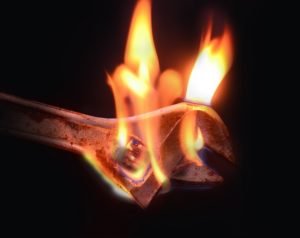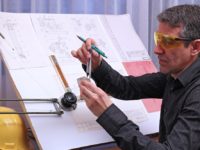
Fire protection engineers design and implement fire safety systems that protect people, buildings, and environments from fire hazards. They work in commercial buildings, industrial facilities, and wildland fire management across government and private sectors. Health and safety engineers (the BLS category that includes fire protection) earn a median annual salary of $99,140, with approximately 6% job growth projected through 2032.
If you're considering a career that combines engineering principles with public safety, fire protection engineering offers a unique opportunity to make a real impact. Whether you're interested in designing sprinkler systems for commercial buildings or developing wildfire mitigation strategies for national parks, this field provides diverse career pathways that protect communities and the environment.
Fire protection engineers bridge the gap between engineering expertise and fire science. They're the professionals who ensure that buildings meet fire safety codes, that evacuation plans actually work under pressure, and that fire safety infrastructure supports effective emergency response during wildfire threats.
What Does a Fire Protection Engineer Do?
The core responsibility of a fire protection engineer is to design systems that protect people and property from fire damage. How they accomplish this varies significantly by location.
Commercial and Industrial Settings
In commercial or industrial environments, fire protection engineers design and improve fire safety systems. They're responsible for ensuring that sprinkler systems function properly, that ventilation systems meet industry standards, and that all equipment complies with current fire safety legislation. They conduct regular inspections, test equipment, and verify that installations meet both local codes and industry regulations.
Wildland and Outdoor Environments
In outdoor settings, fire protection engineers work to ensure that forest firefighters have access to appropriate equipment when and where they need it. They source materials and products for fire control and mitigation, then oversee their strategic placement and implementation. Their engineering background helps them select the most effective technologies for wildfire management.
These engineers often collaborate with Park Rangers and Foresters in rural environments, or work alongside health and safety engineers in urban settings to develop comprehensive fire safety strategies.
Core Responsibilities
Across all work environments, fire protection engineers handle prevention design (both active and passive systems), mitigation planning, risk assessment, training program development, health and safety compliance, equipment purchasing, and hardware system layout. Their work encompasses everything from initial design through implementation and ongoing maintenance.
Where Does a Fire Protection Engineer Work?
Fire protection engineers find opportunities across virtually every sector of the economy. They're employed by federal, state, and local government agencies, with government positions often focused on national parks, state parks, and areas with high wildfire risk.
In government buildings, they promote fire safety regulations, ensure equipment remains up to code, and conduct regular inspections and repairs. Their responsibilities in private and nonprofit sectors mirror these duties-fire protection is required across all industries and building types, regardless of size or organisational structure.
Industry Distribution
While specific data for fire protection engineers are not available, health and safety professionals generally have the highest concentration of employment in manufacturing (approximately 26% of positions). It's reasonable to expect similar distribution for fire protection specialists. The exact numbers and specific roles vary by sector, but qualified candidates typically find that most industries welcome their expertise.
In states affected by wildfires-particularly California-positions are plentiful but highly competitive. A larger proportion of these roles focus on rural wildfire mitigation and prevention rather than traditional building safety.
What Is the Average Fire Protection Engineer Salary?
While the Bureau of Labour Statistics doesn't track fire protection engineers as a separate category, these professionals fall under the broader classification of health and safety engineers. As of May 2022, the median annual salary for health and safety engineers (including fire protection engineers) was $99,140, with 6% job growth projected through 2032.
Salary ranges vary significantly by industry (engineering services typically offer the highest compensation), geographic location, and job demand. In California and other wildfire-prone states, positions may offer competitive salaries but also face more competition for roles. A substantial portion of positions in these regions focus on rural fire safety and wildfire management.
Fire Protection Engineering Jobs & Job Description
Fire protection engineers apply technological developments and engineering principles to advance fire safety across diverse locations-from storage facilities and factories to military installations and office complexes. The role requires a broad skill set that evolves as you gain experience.
Entry-Level vs. Senior-Level Responsibilities
The transition from entry-level to senior fire protection engineer involves not only deeper technical knowledge but also increased management responsibilities and greater strategic decision-making authority. Here's how the roles compare:
| Entry-Level Fire Protection Engineer | Senior-Level Fire Protection Engineer |
|---|---|
| Bachelor's degree in fire protection engineering or related field | Master's degree in fire protection engineering plus extensive field experience |
| Deep knowledge of fire protection concepts: combustion, heat transfer, thermodynamics, fluid mechanics | Advanced expertise in all fire protection engineering concepts plus emerging technologies |
| Assess, repair, and install fire sprinkler systems | Oversee fire protection teams and make strategic decisions on system designs |
| Determine cost evaluations for fire protection projects | Present fire protection design concepts to industry partners and company leadership |
| Assess fire detection devices and alarms; recommend improvements | Investigate fire-related complaints, accidents, and fatalities at work sites |
| Provide efficient, cost-effective designs for fire protection systems | Handle violations of fire safety codes and develop comprehensive resolutions |
| Test and maintain fire alarm systems and protection equipment | Manage complex projects with excellent written, oral, and technical communication |
| Develop emergency evacuation plans and safety protocols | Travel extensively to provide expert support to industry partners |
| Design detailed fire protection schematics and strategies | Lead meetings, training seminars, and educational classes on fire protection |
| Ensure regulatory compliance with local codes and regulations | Invest in ongoing education to stay current on fire protection advances |
| Conduct routine fire safety inspections with detailed documentation | Train employees on all aspects of fire safety and protection systems |
| Apply reasoning and technical aptitude to solve problems systematically | Develop department-wide fire safety policies and strategic initiatives |
What Is the Job Demand for Fire Protection Engineers?
As of May 2022, the median annual salary for health and safety engineers (including fire protection engineers) was $99,140, with 6% job growth projected through 2032. This steady growth reflects both ongoing fire safety improvements and the expanding working population. However, demand won't be uniform across the United States.
Geographic variation is significant. States with frequent wildfires-particularly California, Oregon, Washington, and parts of the Southwest-will likely see stronger demand for fire protection expertise. Rural fire safety and wildland fire management could account for a substantial portion of new positions.
Construction and manufacturing sectors should maintain a steady demand for fire protection engineers. An emerging opportunity is technical services, as software engineering and digital systems are increasingly important to health and safety management.
What Are the Education Requirements to Become a Fire Protection Engineer?
You'll need a bachelor's degree in engineering to enter this field. While you can study any formal engineering discipline, you'll want to focus on courses relevant to fire safety and protection. Look for programs offering modules in environmental safety, workplace health and safety, fire science, and related technical areas. Industrial hygiene or other safety-focused specialisations also provide strong foundations.
High School Preparation
If you're still in high school and interested in fire protection engineering, concentrate on mathematics and science courses. A strong foundation in these subjects will be essential for success in an engineering degree program.
Professional Certification
After completing your bachelor's degree, you'll need to obtain professional certifications. These are typically earned on the job, as fire protection engineering involves substantial practical application. You'll gain hands-on experience throughout your certification process.
Graduate Education
A master's degree is desirable but not required for entry-level positions. However, if you're aiming for higher-level positions with greater responsibility-particularly in policy development or advisory roles-a master's degree becomes a strong asset. Doctoral programs are generally only necessary if you plan to conduct research or teach at the university level.
Learn more about earning a fire science degree.
Fire Protection Engineering - Related Degrees
Frequently Asked Questions
What's the difference between a fire protection engineer and a firefighter?
Fire protection engineers design and implement fire safety systems before fires occur, focusing on prevention and protection through engineering solutions. Firefighters respond to active fire emergencies. While firefighters work on the front lines during fire events, fire protection engineers work behind the scenes to prevent fires from starting or spreading, often never encountering an active fire in their daily work.
Do fire protection engineers need to work for the government?
No, fire protection engineers work across all sectors. While government agencies (particularly parks and public buildings) employ many fire protection engineers, private companies, manufacturing facilities, engineering consulting firms, and nonprofit organisations all need fire safety expertise. In fact, manufacturing alone accounts for approximately 26% of health and safety engineering positions, which includes fire protection specialists.
Can I specialise in wildfire management as a fire protection engineer?
Yes, wildfire management is a growing specialization within fire protection engineering. Engineers in this field work with forest services, national parks, and state land management agencies to develop wildfire prevention strategies, design fuel management systems, and ensure proper equipment placement for wildfire response. This specialization is particularly relevant in Western states with high wildfire risk.
What's the typical career progression for a fire protection engineer?
Most fire protection engineers start with a bachelor's degree and an entry-level position focused on system assessment, installation, and maintenance. After gaining 3-5 years of experience and obtaining professional certifications, you can advance to project management roles. Senior positions (typically requiring a master's degree and 7-10 years of experience) involve overseeing teams, making strategic decisions, developing policies, and consulting experts. Some engineers eventually move into consulting, regulatory compliance, or academic positions.
Is fire protection engineering a stable career choice?
Yes, fire protection engineering offers strong career stability. Fire safety requirements aren't optional-they're mandated by law across virtually all industries and building types. The field projects steady 6% growth through 2032, and climate change is increasing wildfire risk in many regions, creating additional demand for fire protection expertise. The combination of regulatory requirements, public safety needs, and expanding wildfire challenges creates consistent long-term demand for qualified professionals.
Key Takeaways
- Diverse Career Pathways: Fire protection engineers work in commercial buildings, industrial facilities, government agencies, and wildland fire management, offering varied work environments from urban settings to national parks.
- Competitive Compensation: Health and safety engineers (including fire protection specialists) earn a median annual salary of $99,140, with higher pay in engineering services and wildfire-prone states.
- Growing Demand: The field projects 6% job growth through 2032, with particularly strong opportunities in wildfire-prone regions and emerging technical services sectors.
- Clear Educational Path: You'll need a bachelor's degree in engineering plus professional certifications earned through on-the-job experience. Master's degrees enhance advancement opportunities but aren't required for entry.
- Meaningful Impact: Fire protection engineers directly protect lives, property, and environments through prevention-focused engineering solutions, making this a career with tangible public safety contributions.
Ready to explore fire protection engineering programs? Discover accredited engineering degrees that can launch your career in fire safety and protection.
What Kind Of Societies and Professional Organizations Do Fire Protection Engineers Have?
Professional organizations provide valuable networking, continuing education, and career development resources for fire protection engineers:
- Institute of Fire Engineers: Founded in 1918 as a British institute, the IFE has grown into a global organization offering training, certification, and professional support for the international fire safety community.
- Society of Fire Protection Engineers: The SFPE positions itself as the world's largest organization dedicated to fire protection engineering, working to advance engineering standards in fire safety globally.
- National Fire Protection Association: This organization serves as a comprehensive resource database and information service covering fire safety and electrical hazards that can lead to fires.
2024 US Bureau of Labor Statistics salary and job growth figures for health and safety engineers reflect national data, not school-specific information. Conditions in your area may vary. Data accessed January 2026.






